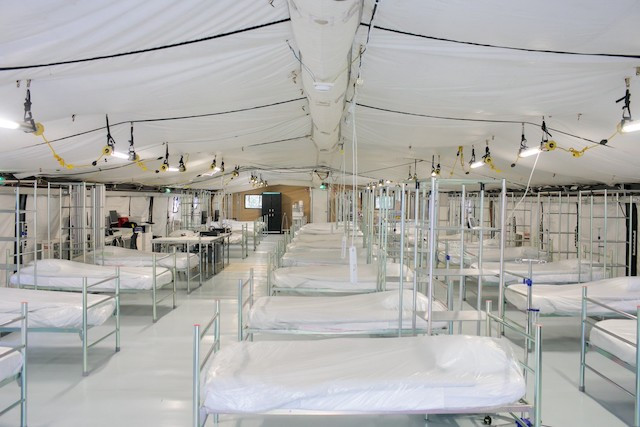Defence minister François Bausch during a committee meeting in parliament said a law to finance the project could be voted before the elections in 2023 for the hospital to be up and running by 2028. The structure would provide crisis medical support in case of emergency and otherwise serve as a crisis training facility.
The hospital forms part of a memorandum of understanding, which the defence ministry signed in 2019 with the aim to develop a strategic action plan on military medicine.
Military medical services in numerous countries have played a big role in fighting the coronavirus pandemic. Luxembourg early on received a field hospital through Nato to add more beds to its treatment capacity. Medical support availability is also a key planning domain for military operations by Nato.
One potential site for a Luxembourg military hospital would be next to the new Südspidol hospital in Esch-sur-Alzette, which is set to open in 2026, Bausch said. A group of experts will be tasked with a feasibility study based on requirements put together by the University of Luxembourg, which newly offers a Bachelor’s medical degree, and the Luxembourg association of dentists and doctors (AMMD).
All Nato members at a 2014 summit in Wales pledged to spend at least 2% of their GDP on the military, a difficult feat for Luxembourg, which has a high GDP compared to the size of its army, which counts just over 400 active-duty soldiers.
It recently invested in a military observation satellite, bought an A400M transport aircraft and co-funded a multinational support plane programme as part of plans to up its military spending to 0.72% by 2025, up from 0.6% in past years.
And Luxembourg will be spending around €200m on refurbishing the Nato Support and Procurement Agency’s facilities in Capellen. The NSPA is Nato’s “primary enabler”, managing acquisitions, logistics, medical and infrastructure capabilities, and operational and systems support and services.
Luxembourg’s contribution to the NSPA’s expansion covers around two-thirds of the project’s cost.
